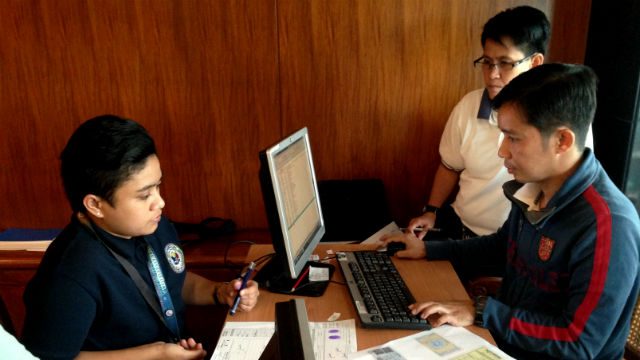SUMMARY
This is AI generated summarization, which may have errors. For context, always refer to the full article.

MANILA, Philippines – The Makati city government conducted the first round of its audit of casual employees on Thursday, September 17, in a bid to rid the city hall of “ghost” employees.
The Makati Action Center (MAC) required 1,790 casual workers from 5 departments to first apply for an automated teller machine (ATM) card from the Land Bank of the Philippines (LBP) before they were handed cash envelopes with their salaries for the period of September 1 to 15.
The employees audited on Thursday included 532 workers from the Office of the Mayor, 853 from the Makati Public Safety and Assistance Department, 120 from the Makati Social Welfare Department, 200 from the Department of Engineering and Public Works, and 85 from the Urban Development Department.
MAC officer-in-charge Arthur Cruto told reporters that acting Mayor Romulo “Kid” Peña Jr directed his department to determine if there are indeed “ghost” employees or those whose names appear on the payroll but who do not show up for work. (READ: Senate summons documents on Binay aide’s pay)
“The stronger the facts, the weaker the lies. In the same manner [that] we ascertained the existence of other ghost transactions, we believe a meticulous and transparent auditing process is the best way to unearth the truth in the issue of ghost employees,” said Cruto, whose office is also currently auditing Makati’s benefit program for the elderly.
He explained that the employees who will claim their salaries after 4 to 5 days will be subject to an investigation by the MAC.
“If you are indeed a legitimate [employee] or talagang nagtatrabaho, there’s no way na ‘di ka pupunta para sumahod (If you are indeed a legitimate employee, there’s no way you will not come here to get your pay),” he added.
Audit process

Casual employees went through several stages for the audit.
At the registration booth, workers were required to present two government identification cards and their employee IDs. A MAC representative then asked them to name their respective immediate supervisors and two of their barangay officials.
“Kung talagang taga-Makati ‘yan at kung talagang dito nakatira, kasama ‘yun (barangay officials’ names) sa vinavalidate namin. Kung talagang nagtatrabaho sila, they [should] know the name of their immediate head,” said Cruto.
(If they really are from Makati, they would know the names of their barangay officials. If they are really working, they would know the name of their immediate head).
The casual workers were then handed their LBP account application forms to be filled out and submitted to LBP representatives together with two photo copies of their government IDs and two 1×1 photos.
Their biometrics were then captured because the city government is starting to use this method to get the attendance of employees. After this, the casual workers were given their cash envelopes.
According to Makati Regional Trial Court Branch 146 administrative clerk JM Verches, the whole process only took her 10 to 15 minutes. She told Rappler she prefers to get her salary through the ATM.
“ATM [ang prefer ko], kasi mas hindi magulo sa ATM. Saka makikita mo ‘yung pinakatotal ng pera mo, saka meron kang privacy (I prefer the ATM because it’s organized. You get to see the total amount you have and you also have privacy),” she said.
Verches, who started working for the Makati city government in June 2015, also agrees with the purpose of the audit.
“Okay naman para makita talaga kung may mali, na anomalya [na] nangyayari o salang-sala na talagang walang ‘ghost’ employees (I’m okay with this so we can determine if there really are anomalies or we can exhaust all means to say there are no ‘ghost’ employees),” she said.
Long-time project of the Binays

Peña, who sits as acting mayor following Mayor Jejomar Erwin “Junjun” Binay Jr’s 6-month preventive suspension, previously hinted that “ghost” employees could be benefiting from the current system of handing salaries in cash envelopes.
He then committed to fully automate the payroll system by the end of 2015.
However, Binay’s spokesperson Joey Salgado told Rappler that this is not the first time that the Makati city government has attempted to automate its payroll system. (READ: Who refused ATM payroll in Makati? Not the Binays)
“Before Peña again grabs credit, salaries through ATM is a project of Mayor Binay. Target was to have all employees enrolled before the year ends,” Salgado said in a text message, adding that capturing employees’ biometrics has already been initiated by Binay prior to his suspension. (READ: Binay camp accuses Kid Peña of ‘credit-grabbing,’ ‘epal moves’)
Two city resolutions were in fact passed by the suspended mayor in 2013 and 2014, respectively, in an effort to have all employees receive their salaries through ATM cards.
During the term of his parents, Vice President Jejomar Binay and Elenita, as mayors of Makati, they also worked to automate the payroll system.
The automation process has been delayed because of the inefficiency of ATMs when they were first introduced in the country, as well as the inconvenience city hall employees experienced because of this.
City hall workers also wanted to get even the last centavo of their salaries, something an ATM will not allow a cardholder to do.
Office of the Mayor community affairs official I Bong Cristal shared the same sentiments when asked by Rappler on Thursday.
“‘Yung mga ATM machine sa lugar namin [sa Guadalupe ay] palaging offline… Maraming [ATM] dun pero karaniwang offfline. ‘Di naman palagi pero ‘pag nagtitiyempo ako, kaya nakasanayan ko na ‘yung cash envelope,” added Cristal, who is a casual employee by choice since 2003.
(The ATM machines in our area in Guadalupe are offline whenever I go there, that’s why I got used to receiving cash envelopes.)
However, he still thinks the move to automate the payroll system is “fair and square.” – Rappler.com
Add a comment
How does this make you feel?
There are no comments yet. Add your comment to start the conversation.